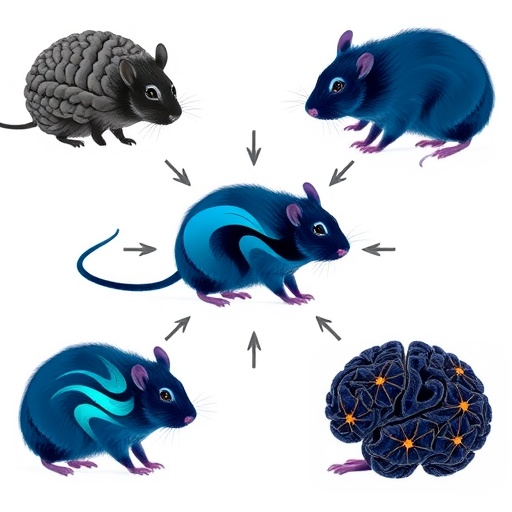In a groundbreaking study that reveals fascinating insights into neurocognitive recovery following surgery, researchers have turned their attention to dexmedetomidine, a medication traditionally used for sedation. The study, conducted by Zhang, Hao, and Wang, embarks on exploring its potential beyond mere sedation, positioning it as a pivotal player in enhancing neurocognitive outcomes in aged populations. The importance of this research cannot be understated bearing in mind the increasing number of aging individuals undergoing surgical procedures that are often accompanied by postoperative cognitive dysfunction.
Elderly patients face myriad health challenges, one of which is the risk of cognitive decline post-surgery. This trial posits that dexmedetomidine could mitigate such changes. By investigating the effects of dexmedetomidine pretreatment on age-related neurocognitive recovery in mice, the study aimed to bridge the gap between sedative use and cognitive health. This endeavor not only opens new avenues in postoperative care but also heralds potential advancements in how clinicians approach the sedation of vulnerable populations.
At the heart of this research lays a profound understanding of the mechanisms involved in neuroinflammation, particularly concerning microglial cells in the hippocampus—crucial for learning and memory functions. The authors drew on existing literature that suggests that microglial activation significantly contributes to the neuroinflammatory processes leading to cognitive impairment. Thus, through their innovative approach, the study undertakes to unveil the protective layers that dexmedetomidine may provide by modulating these microglial cells.
Dexmedetomidine is known for its selective alpha-2 adrenergic agonistic properties, which aids in inducing sedation while preserving the integrity of the respiratory system. However, the new evidence suggests that its utility extends beyond these known realms, affecting neuroinflammatory pathways. The study demonstrates that the administration of dexmedetomidine prior to surgery significantly curtails the activation of hippocampal microglia, hinting at its role in managing post-surgical cognitive deficits.
The results showed that aged mice receiving dexmedetomidine exhibited notable improvements in cognitive function compared to their counterparts that did not receive the treatment. This enhances our understanding of how pharmacological interventions can improve outcomes for elderly surgical patients. The animals not only showed less evidence of neuroinflammation but also reverted to a more typical cognitive function level post-surgery, highlighting dexmedetomidine’s preventive role in age-related cognitive decline.
Cholinergic pathways are closely linked with memory and cognition. Through the activation of these anti-inflammatory pathways, dexmedetomidine exerts a powerful influence in controlling the neuroinflammatory response. This dual action—both as a sedative and an anti-inflammatory agent—positions dexmedetomidine as an exemplary candidate for further investigation into its rehabilitative applications in postoperative care for geriatric patients.
Moreover, the study’s implications stretch beyond surgery. The findings beckon a broader dialogue about the management of cognitive decline in the aging population, advocating for a revisit of pharmacological strategies traditionally reserved for anesthesia and sedation. As researchers continue to unravel the complexities surrounding brain health in the elderly, the findings from this investigation necessitate further clinical trials to corroborate its effectiveness in diverse age groups and surgical contexts.
It is essential to understand that post-surgical cognitive impairment is multifaceted, influenced by biological, psychological, and environmental factors. The knowledge that dexmedetomidine can effectively address one of the biological contributors, namely microglial activation, offers hope to clinicians and caregivers alike. The pursuit of medications that can enhance recovery outcomes is forever crucial in a society that values its aging population.
Such revolutionary research not only increases the likelihood of improved surgical outcomes but also elevates the standard of care for elderly patients who are frequently burdened by multiple health issues. As healthcare evolves, there is a palpable need for strategies that not only focus on survival post-surgery but also on the quality of life in the years that follow.
Educational efforts surrounding the implications of this research will also be vital in the coming years. Healthcare professionals should be equipped with insights into the benefits of dexmedetomidine in surgical practice to instill confidence in prescribing this medication for older adults. The ongoing discourse around cognitive health post-surgery deserves equal attention, paralleling discussions about physical recovery.
In summary, the prominent role of dexmedetomidine in neurocognitive recovery post-surgery establishes a benchmark for future research. The potential to safeguard against cognitive decline through preoperative interventions sets a compelling precedent for ongoing studies into other existing medications and their applications in neuroprotection.
The exploration of the intricate interplay between drugs and neuronal health underscores a critical need for interdisciplinary collaboration. Experts in pharmacology, neurology, geriatrics, and anesthesiology can unite their insights, shaping a multi-faceted approach to treating the unique challenges these patients present in healthcare settings today.
With the backdrop of an aging population globally, the relevance of studies like these cannot be overlooked. Emerging research like Zhang and colleagues offers a glimpse into promising new therapeutic avenues, urging us to rethink our traditional methodologies while respecting the complexity of the aging brain.
In conclusion, the study leads us to a renewed appreciation of dexmedetomidine’s role—not merely a sedative but a transformative agent in the pursuit of cognitive resilience among the elderly. This is a reminder that in biomedical research, every discovery has the potential to realign our understanding of health practices and patient care paradigms.
Subject of Research: Effects of dexmedetomidine on postoperative cognitive recovery in aged mice.
Article Title: Dexmedetomidine pretreatment improves postsurgical delay in neurocognitive recovery in aged mice by inhibiting hippocampal microglial activation via activation of cholinergic anti-inflammatory pathways.
Article References:
Zhang, Q., Hao, S., Wang, G. et al. Dexmedetomidine pretreatment improves postsurgical delay in neurocognitive recovery in aged mice by inhibiting hippocampal microglial activation via activation of cholinergic anti-inflammatory pathways.
BMC Neurosci 26, 61 (2025). https://doi.org/10.1186/s12868-025-00969-1
Image Credits: AI Generated
DOI: 10.1186/s12868-025-00969-1
Keywords: Dexmedetomidine, Neurocognitive recovery, Aged mice, Microglial activation, Cholinergic anti-inflammatory pathways, Post-surgical cognitive dysfunction.
Tags: bridging sedation and cognitive functiondexmedetomidine effects on neurocognitive recoveryelderly mice cognitive decline post-surgeryenhancing cognitive recovery with medicationsgeriatric postoperative care advancementsmechanisms of neuroinflammation in agingneurocognitive outcomes in elderly patientsneuroinflammation and microglial cellspostoperative cognitive dysfunction in agingresearch on sedatives and brain healthsedation and cognitive healthsurgical procedures and cognitive recovery





